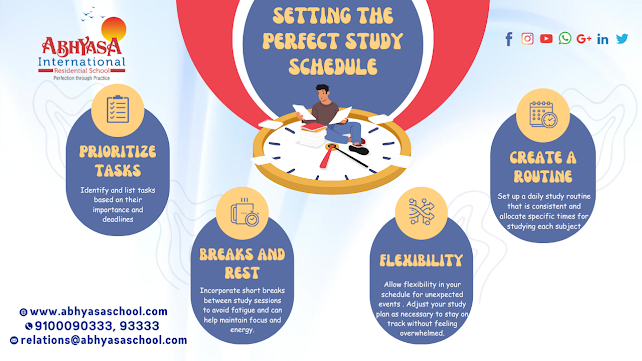Exams are a crucial part of a student's academic journey, and effective preparation is the key to success. One of the most important steps in exam preparation is creating a well-structured study schedule. A perfect study schedule helps students manage their time efficiently, reduces stress, and ensures comprehensive coverage of all subjects.
This guide will provide students and parents with a step-by-step approach to designing an optimal study plan that maximizes productivity and retention.
Step 1: Assess Your Syllabus and Exam Dates
A. Before creating a study schedule, students should:
B. List all subjects and topics to be covered.
C. Prioritize subjects based on difficulty level and exam weightage.
Note important dates (exams, deadlines, and revision periods).
Parents can assist by helping students break down the syllabus into manageable sections.
Step 2: Set Realistic Goals
A. Daily & Weekly Targets: Divide topics into small, achievable tasks.
B. SMART Goals: Ensure goals are Specific, Measurable, Achievable, Relevant, and Time-bound.
C. Balance Weak & Strong Areas: Allocate more time to difficult subjects while maintaining strength in others.
Step 3: Allocate Time Wisely
A well-balanced study schedule should include:
A. Study Blocks: 45-60 minute study sessions with 5-10 minute breaks (Pomodoro Technique).
B. Active Learning: Use techniques like summarizing, flashcards, and practice tests.
C. Revision Time: Dedicate at least 20% of study time to revision.
D. Flexible Buffer Time: Extra slots for unexpected delays or difficult topics.
Sample Daily Study Plan
Activity
- Morning revision (memory-based subjects)
- School Hours
- Practice problems (Math/Science)
- Theory subjects (History, Languages)
- Quick revision & doubt-solving
Step 4: Eliminate Distractions
A. Designated Study Space: Quiet, well-lit, and free from distractions.
B. Digital Discipline: Use apps like Forest or Focus To-Do to limit phone usage.
C. Parental Support: Parents can help by minimizing interruptions during study hours.
Step 5: Include Breaks & Self-Care
A. Short Breaks: Essential for maintaining focus (e.g., stretching, walking).
B. Adequate Sleep: 7-8 hours for memory consolidation.
C. Healthy Diet & Hydration: Boosts concentration and energy levels.
Step 6: Track Progress & Adjust
A. Weekly Reviews: Check if targets are met and adjust the schedule if needed.
B. Mock Tests: Simulate exam conditions to assess preparation.
C. Feedback from Teachers/Parents: Helps identify areas needing improvement.
Tips for Parents
1. Encourage Consistency: Help students stick to their schedule.
2. Provide Resources: Ensure access to study materials and a conducive environment.
3. Motivate, Don’t Pressure: Positive reinforcement works better than stress.
Conclusion
A perfect study schedule is not about studying for long hours but studying smartly. By following a structured plan, students can reduce last-minute stress, improve retention, and perform better in exams. Parents play a crucial role in supporting their children by providing guidance and maintaining a balanced routine.
Start planning today, stay disciplined, and success will follow!
Abhyasa School - Nurturing Excellence Through Smart Learning.

No comments:
Post a Comment